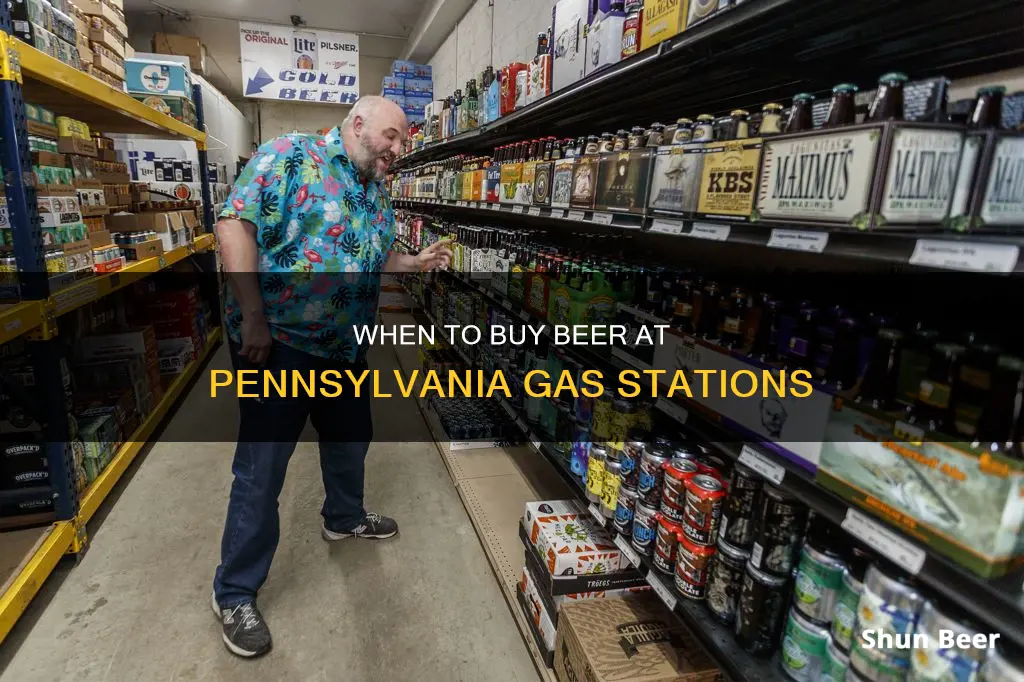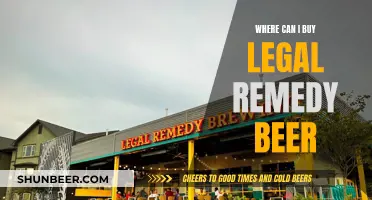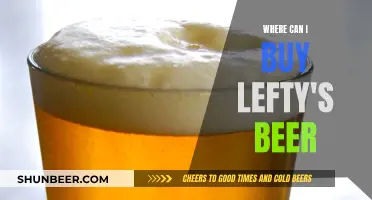
Pennsylvania has some of the strictest alcohol laws in the United States, which can be traced back to the Prohibition era. The state has complex regulations surrounding the sale of beer, wine, and liquor, with rules varying depending on the type of establishment and the day of the week. So, what time can you buy beer at a gas station in Pennsylvania?
| Characteristics | Values |
|---|---|
| Day of the week | Monday to Saturday |
| Time | 2 a.m. to midnight |
| Day of the week (continued) | Sunday |
| Time (continued) | 9 a.m. to 9 p.m. with a Sunday Sales Permit |
| Maximum amount per transaction | 2 six-packs |
| Packaging | 12 oz cans or bottles in 6- or 12-packs |
| Packaging (continued) | 19 or 25 oz cans, depending on ABV |
What You'll Learn
- Beer can be purchased from gas stations in Pennsylvania between Monday at 2 a.m. and midnight Saturday
- Gas stations require a specific license to sell beer, which allows up to two 6-packs per transaction
- Bars and restaurants can sell beer from 7 a.m. to 2 a.m. Monday to Saturday, and from 9 a.m. to 2 a.m. on Sundays
- Beer distributors are the main retail location type for beer sales in Pennsylvania
- Pennsylvania has some of the strictest and most complex alcohol laws in the United States

Beer can be purchased from gas stations in Pennsylvania between Monday at 2 a.m. and midnight Saturday
Pennsylvania has some of the strictest alcohol regulations in the United States, which can be traced back to the Prohibition era and the influence of Gifford Pinchot, a "dry" governor who served from 1923 to 1935. Even after Prohibition was repealed during his second term, Pinchot maintained his tough stance on alcohol control. He believed that the best way to prevent corruption in the alcohol industry was through state control, which led to the creation of the Pennsylvania Liquor Control Board.
The state's complex liquor laws have been a source of frustration for many, but there have been recent efforts to loosen these restrictions. In 2016, Governor Tom Wolf signed Acts 39 and 166, which relaxed rules around beer and wine sales and shipping, and allowed for expanded store hours. More recently, in 2024, Governor Josh Shapiro signed bipartisan legislation permitting the sale of ready-to-drink cocktails at grocery stores, gas stations, and other retail liquor licensees and beer distributors.
Despite these changes, buying beer in Pennsylvania can still be confusing, as different types of establishments have different rules and licenses. Beer distributors, for example, have the fewest restrictions and can sell kegs, cases, 12-packs, 6-packs, single bottles, and growlers for off-premise consumption. On the other hand, bottle shops, grocery and convenience stores, bars, and other licensed establishments can only sell up to 192 fluid ounces of beer per transaction (equivalent to 12 16-ounce cans).
When it comes to gas stations, they are permitted to sell beer from Monday at 2 a.m. until midnight Saturday. They need a specific license that allows them to sell up to two 6-packs per transaction. Gas stations can offer beer in 12 oz cans or bottles in 6- or 12-packs, as well as 19 or 25 oz cans, depending on the ABV. These rules also apply to grocery stores, which have some additional hour-of-operation contingencies.
So, if you're looking to buy beer from a gas station in Pennsylvania, you can do so any time between Monday at 2 a.m. and midnight Saturday, as long as the gas station has the required license.
When to Buy Beer in Catawba County, North Carolina
You may want to see also

Gas stations require a specific license to sell beer, which allows up to two 6-packs per transaction
Pennsylvania's liquor laws are notoriously complex and restrictive, a legacy of the Prohibition era. The state's governor from 1923 to 1935, Gifford Pinchot, was a teetotaler who, even after Prohibition was repealed, maintained a tough stance on alcohol control. Pinchot established the Pennsylvania Liquor Control Board (PLCB) to license establishments, set serving hours, and regulate prices.
The PLCB operates on a quota system, currently allowing one license per 3,000 county inhabitants. There are several types of liquor licenses available, including retail liquor licenses and retail dispenser licenses. Retail liquor licenses can sell liquor, wine, malt, and brewed beverages for consumption on the premises. Retail dispenser licenses have the same restrictions but are limited to only selling brewed and malt beverages.
Gas stations in Pennsylvania require a specific license to sell beer. This license allows them to sell up to two 6-packs of beer per transaction, or 192 fluid ounces, for "off-premise consumption." This means that customers cannot purchase beer and drink it at the gas station. The hours for selling beer vary depending on the day of the week and whether the gas station has a Sunday Sales Permit. On Monday through Saturday, beer can be sold from 7:00 a.m. to 2:00 a.m. of the following day. With a Sunday Sales Permit, beer can be sold from 9:00 a.m. to 9:00 p.m. on Sundays.
In addition to gas stations, other establishments that can sell beer include beer distributors, bottle shops, grocery stores, convenience stores, bars, and breweries. Beer distributors have the fewest restrictions and can sell beer in various package configurations, including kegs, cases, 12-packs, 6-packs, single bottles, and growlers. Bottle shops, grocery stores, convenience stores, bars, and other places can obtain a license to sell up to 192 fluid ounces of beer per transaction, equivalent to 12 16-ounce cans. Licensed breweries can sell beer for on-site or off-site consumption, as well as products from other Pennsylvania-licensed producers.
Recently, Pennsylvania's liquor laws have been relaxed slightly. In 2016, Governor Tom Wolf signed Acts 39 and 166, loosening restrictions on beer and wine sales, shipping, and store hours. Additionally, in 2024, Governor Josh Shapiro signed bipartisan legislation allowing the sale of ready-to-drink cocktails at grocery stores, gas stations, and other retail liquor licensees and beer distributors.
Where to Buy Beer in Wesley Chapel, Florida?
You may want to see also

Bars and restaurants can sell beer from 7 a.m. to 2 a.m. Monday to Saturday, and from 9 a.m. to 2 a.m. on Sundays
Pennsylvania has some of the strictest alcohol regulations in the United States. These laws can be traced back to the Prohibition era and the state's former governor, Gifford Pinchot, who was a teetotaler. Pinchot established the Pennsylvania Liquor Control Board to license establishments, set serving hours, and regulate prices.
Bars and restaurants in Pennsylvania can sell beer from 7 a.m. to 2 a.m., Monday to Saturday. On Sundays, they can sell beer from 9 a.m. to 2 a.m. Monday morning, provided they have a Sunday Sales Permit. These hours are the same for both on-premises consumption and off-premises sales. It is worth noting that while bars and restaurants can sell beer for on-premise consumption, they do not provide to-go sales.
The hours for selling beer in bars and restaurants are in line with the serving hours set by the Liquor Control Board for retail licenses, which include both retail liquor licenses and retail dispenser licenses. The Sunday Sales Permit allows establishments to serve alcohol starting at 9 a.m. on Sundays instead of the usual 11 a.m.
It is important to note that there are different types of licenses and restrictions for establishments selling alcohol in Pennsylvania. For example, beer distributors, which are the main retail locations for beer sales, have different hours and can sell beer in various quantities, including cases, 12-packs, 6-packs, and singles. Additionally, grocery stores have similar restrictions to gas stations regarding the sale of beer, with some differences in hours of operation.
Chicago Beer Laws: Friday Night Confusion
You may want to see also

Beer distributors are the main retail location type for beer sales in Pennsylvania
Pennsylvania has some of the strictest alcohol regulations in the United States, which can be traced back to the Prohibition era and the influence of Gifford Pinchot, who served as governor from 1923 to 1935. Pinchot, a teetotaler, established the Pennsylvania Liquor Control Board to license establishments, set serving hours, and regulate prices. This has resulted in a complex system of alcohol laws that vary by location and type of alcohol.
Beer distributors are the primary retail location for beer sales in Pennsylvania. These distributors typically operate from 8 am to 11 pm Monday through Saturday and are permitted to sell beer on Sundays from 9 am to 9 pm with a special license. There is no limit to the amount of alcohol that can be purchased per transaction at these distributors, and they can sell beer in various package sizes, including cases, 12- or 6-packs, and singles. They can also sell kegs and fill growlers.
While beer distributors are the main source for beer sales, other locations such as bars, restaurants, breweries, and taprooms also sell beer. These establishments have more restricted hours for beer sales, operating from 7 am to 2 am Monday through Saturday and requiring a Sunday Sales Permit to sell beer on Sundays between 9 am and 2 am Monday morning. Additionally, they can only sell beer for on-premise consumption and do not offer to-go sales.
Pennsylvania's unique alcohol laws also allow certain grocery stores, convenience stores, and gas stations to sell beer, although with even more limited hours and quantity restrictions. For example, gas stations can sell beer from Monday at 2 am until midnight on Saturday, with a license permitting the sale of up to two 6-packs per transaction.
In summary, while multiple retail locations in Pennsylvania can sell beer, beer distributors remain the primary source for beer sales due to their more relaxed restrictions on quantity, package size, and operating hours.
The Best Places to Buy Beer in Maine
You may want to see also

Pennsylvania has some of the strictest and most complex alcohol laws in the United States
Pennsylvania's alcohol laws are considered some of the strictest and most complex in the United States. The state's complex alcohol laws can be traced back to the Prohibition era and the stance of Gifford Pinchot, who served as governor from 1923 to 1935. Pinchot was a ""dry" governor, even as Prohibition was repealed during his second term. He believed that the best way to prevent corruption in the alcohol industry was through state control. As a result, the Pennsylvania Liquor Control Board was created to license establishments, regulate prices, and set serving hours.
The Liquor Control Board operates on a quota system, which has changed over the years. The current quota is one license for every 3,000 county inhabitants, but existing licenses in areas that exceed the quota are still valid. There are several types of liquor licenses available, including retail licenses, which are further divided into retail liquor licenses and retail dispenser licenses. Retail liquor licenses allow for the sale of liquor, wine, malt, and brewed beverages for consumption on the premises. On the other hand, retail dispenser licenses are limited to the sale of brewed and malt beverages only.
Pennsylvania's alcohol laws have some peculiarities not found in other states. For example, establishments with a retail license are allowed to serve alcohol from 7:00 am to 2:00 am Monday through Saturday and from 11:00 am to 2:00 am on Sundays, provided they have a Sunday Sales Permit. Additionally, there are 683 municipalities in the state that are at least partially dry, meaning they have restrictions on alcohol sales.
The state also has specific rules for different types of establishments, such as restaurants, hotels, and clubs. For instance, restaurants with a liquor license must have a minimum of 400 square feet of space and seating for at least 30 patrons. Hotels with a liquor license must also meet similar requirements and are allowed to sell alcohol for on-premises consumption only.
In recent years, there have been some efforts to privatize the sales of wine and spirits in Pennsylvania, but the state has maintained a monopoly over these sales since the repeal of Prohibition. While the state's alcohol laws have loosened slightly, with Governor Tom Wolf signing Acts 39 and 166 into law in 2016 to relax some restrictions, Pennsylvania's alcohol laws remain among the most complex and restrictive in the nation.
Coors Beer: An Unlikely Western Icon
You may want to see also
Frequently asked questions
Gas stations in Pennsylvania can sell beer from 2 a.m. on Monday until midnight on Saturday. They require a specific license that allows up to two 6-packs per transaction.
Gas stations can sell beer in 12 oz cans or bottles in 6- or 12-packs. They can also sell beer in 19 or 25 oz cans, depending on the ABV.
Beer can be purchased from licensed beer distributors, bars, restaurants, breweries, and taprooms.







